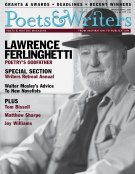While Sharpe often has a general idea when he begins writing, novels, he says, "are about people, not ideas." And it is through the voice of the characters that he discovers plot and everything else. "I just sort of drink a lot of coffee and sit down and start fantasizing and see what happens," he says. "Some writers plan things more meticulously than others, but for me—not only can I not do it any other way, but it also turns out to be one of the great pleasures of writing."
Jamestown is the closest he's come to writing a novel with a clear direction in mind. "It's a more explicitly political book than I've ever written. Certainly my process was still quite intuitive and irrational, but my intuition and irrational thoughts were quite focused—and still are—on the intense frustration of being an American at this moment and being led by these people who, it strikes me, really are hastening the end of the American empire. This is maybe not such a bad thing, but I don't know that it needs to be done quite so violently."
Violence is everywhere in Jamestown. The colonists, who are constantly vying for power in the pecking order, have daily physical squabbles; the Native Americans are equally savage to each other and the colonists, flaying their enemies, for example, with sharpened mussel shells, a detail that Sharpe pulled from his research.
In fact, the genesis of the book came from a research project Sharpe began in his capacity as a teacher. As a result of his work for Teachers & Writers at Columbia in the early '90s, he started leading professional development workshops in writing for public school teachers. He was asked in the late '90s to compose some creative writing exercises for a group of middle school social studies teachers in Queens who were planning to teach a unit on Jamestown. After reading Captain John Smith's accounts of his sojourn in Jamestown and developing the exercises, Sharpe found himself compelled by the material. "I was drawn to the mix of foreignness and familiarity in the voice of Smith, whom I now think of as a proto–Founding Father, for good and ill," Sharpe says. "I was also drawn to the sheer weirdness and extremity of the story: a hundred Englishmen—yes, all men!—boarding a ship, sailing for months, arriving at this unfamiliar place, getting shot with arrows, trying to speak and negotiate with a group of natives with whom they shared not a single word in common. And how weird and awful this must have been for the natives: Here come these pale, hairy, bad-smelling, overdressed, rude interlopers on enormous ships, with thunderous, deadly metal weapons, blithely moving in on their turf. Sometime around then I began to conceive of doing a big old Jamestown creative writing project myself."
The speech patterns of the 1600s were something that he wanted to make reference to in Jamestown. "I wanted the book to bear the imprint or have the stain not only of contemporary speech patterns and diction, but also of Elizabethan and Jacobean speech patterns, so I turned to my favorite writer of that period, Shakespeare." The prose in Jamestown combines the rhythms of text-messaging patter with iambic meter, allusions to hip-hop culture and canonical poetry (Wallace Stevens's, in particular) strewn throughout.
Language in general—its potential, limits, power, and failings—is a major concern in Sharpe's work. He sees the language barrier between the English and the Algonquians as a model for "the way in which each of us has our own private associations that inform every word that comes out of our mouths. Communication," Sharpe says, "is always an act of translation."
Soft Skull's Nash is particularly committed to promoting Jamestown, not only because he believes in the book, but also to show support for a writer who, despite having received such success, has decided to stay with a small press. But Nash's efforts were complicated by the news last December that Advance Marketing Services, the company that owns Publishers Group West (PGW), a distributor of many independent publishers, including Soft Skull Press, declared bankruptcy, leaving numerous publishers unpaid for a portion of sales.
Nash says that the situation did not affect publishing plans for Jamestown, but did make their execution more difficult. However, in typical small press resourcefulness, Nash arranged a deal with Harcourt, the paperback publisher of Jamestown, to prepay the on-publication part of the book's advance, which gave Soft Skull the funds to publish Jamestown on time, with an initial print run of fifteen thousand copies. In another act of small press innovation, Soft Skull has created a MySpace page for Pocahontas at www.myspace.com/146577234.
Sharpe has the usual grandiose hopes for his book that any writer would, but he tries not to get too invested in them. "There was a much bigger readership for The Sleeping Father than there had been for my two previous books, but I don't know, the marketplace is so fickle." And although filled with humor and delightful for its lyricism, Jamestown is a harsh book for what it says about American culture. But the act of writing itself is a positive one that's inherently hopeful. "It is a redemptive activity that I've devoted my life to, both as a writer and teacher," says Sharpe. "I put tremendous stock in language as a potential vehicle for redemption."
Mary Gannon is the editor of Poets & Writers Magazine.








